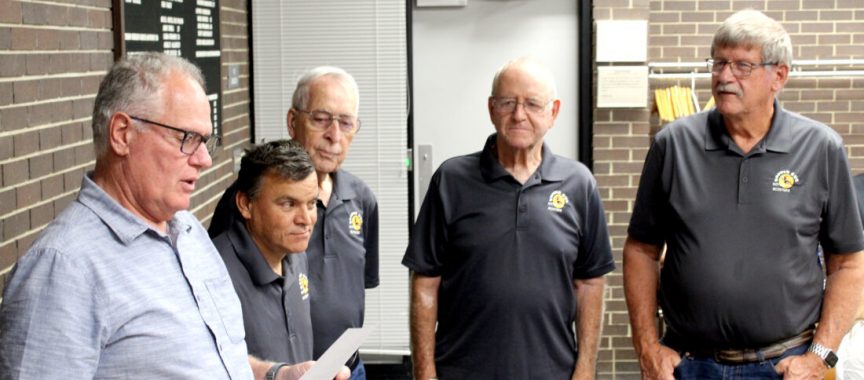The City Council of Webster City advanced a number of familiar, ongoing projects at its regularly-scheduled meeting Tuesday night.
The meeting was held on Tuesday rather than the customary Monday in observance of the Labor Day holiday.
Approval was given to the sale of $1.9 million in general obligation bonds. The proceeds will be used for a variety of projects, including street and sidewalk construction, acquiring and installing street lights, signs and signals, and for an overhaul of the HVAC system in City Hall.
The preliminary official statement: Bids from those entities wishing to buy the bonds will be received until 10 a.m. Monday, September 16, at the office of the city finance director. An electronic bidding system known as “Parity” will be used in selling the bonds.
The 2023 sanitary sewer rehabilitation project is complete and can now be closed out. The contractor, Nels Pederson, of Badger, repaired the sanitary sewer at five locations and slip-lined about 2,700 feet of damaged or cracked sewer mains. Including all change orders, the project cost $358,882 against an estimated budget of $300,000. Slip lining adds extra life to old sewer pipes, is less expensive than replacement, and doesn’t require digging up streets.
In another project, the Street Department was given approval to spend an estimated $36,000 to build a new sidewalk on the north side of Fair Meadow Drive between Superior Street and the end of the existing sidewalk south of Stone Ridge Townhomes. The new 4-foot-wide walk provides safe access to the apartments, Van Diest Medical Center and Hamilton County Courthouse.
Councilman McKinney commented, “This is a much-needed project; I see people walking in the street at this location all the time.”
Street Department Supervisor Brandon Bahrenfuss explained that by moving the proposed sidewalk about four feet to the north it might be possible to save $9,000 on the project cost. The department will look into the possibility of this immediately. He noted concrete contractor Castor Construction, Fort Dodge, should be able to finish the work this year.
The latest in a long line of utility-related projects were approved, including control panels for Reisner Subdivision, two new easements for the electric underground conversion project, and a new pump for the wastewater treatment plant.
Here are details:
— New 69KV control panels will be purchased from Electrical Power Products, Des Moines, for $177,588. The engineer’s estimate for the new panels was $264,000, before taxes, meaning the equipment came in $86,417 lower, again before taxes. The city will share the cost with its partner in the project, Corn Belt Power Co-Op, with Corn Belt paying $131,522, and the City of Webster City $46,061.
— In the massive, long-term project to bury electricity supply cables underground throughout Webster City, two new easements were sought to allow the work to continue. These were granted by Douglas J. Anderson, 616 Park Avenue, and Barbara Knuths, 612 Maple Avenue.
Although more expensive than above-ground power lines, there are many advantages to underground cables. Buried cables aren’t subject to damage from high winds, lightning strikes or vehicles running into poles, an extremely common occurrence. As well, underground cables eliminate hazards to low-flying aircraft and wildlife. The modern movement toward burying electrical supply lines began after WWII in Britain and Europe, where bombing destroyed surface lines. It has seen growing popularity in the U.S. more recently.
— The council approved purchase of a dry pit submersible pump made in Sweden by Flygt (say “flight”), for the wastewater treatment plant for $180,660. It replaces a pump installed in 1996 which has reached the end of its useful life. The old pump could have been repaired for $93,193.88, but would only have been covered by a 60-day warranty. The new pump, with upgraded components and performance, comes with a five-year warranty, and was seen as a better value over time.
— A third reading of a proposed amendment to the International Property Maintenance Code was approved, so the measure becomes part of the Official Code of the City of Webster City. The changes allow the city to enforce maintenance of buildings, residential and commercial, to prevent dilapidation and deterioration, which has grown increasingly prevalent in recent years.
— Finally, Mayor John Hawkins declared September 9-14, 2024, “Doodlebug Days” in Webster City. As in years past, most of this year’s events will be held at the Hamilton County Fairgrounds. The Doodlebug, a small scooter powered by a Briggs & Stratton engine, was produced by Beam Industries in its Webster City factory for only two years: 1946-48. A total of 40,000 were built.
Only about 1,000 Doodlebugs are known to exist today. Skaggs-Skogmo, of Minneapolis, was a major investor in Beam and also owned Gambles and Western Auto Stores, the only outlets that sold Doodlebug scooters.
View this article as it originally appeared in the Daily Freeman-Journal.
Last modified: September 4, 2024

